INVESTINNEBA TOKEN
NEBA Token is developed by NEXT BASKET, a SaaS platform enabling businesses to easily build and manage online stores. Now, NEXT BASKET is launching NEBA Token to transform global e-commerce.
Join us in revolutionizing e-commerce through blockchain technology and decentralized solutions.
Invest now and help create the next generation of online commerce, with the potential for significant profits after the TGE.
Web2 & Web3 Integration
Seamlessly combining traditional e-commerce with blockchain technology.
Decentralized E-commerce
Transforming online commerce through blockchain innovation.
Multiple Revenue Streams
Four standalone projects providing synergistic opportunities.
WHO IS BEHIND NEBA TOKEN
This is NEXT BASKET, a SaaS e-commerce platform creating online stores for its clients (merchants, store owners), designed to work with NEBA Token. The platform is simple to use and maintain, allowing store owners to design and manage their websites with little or no prior training
ABOUT NEXT BASKET
E-commerce businesses on four continents
35,000 registered platform users
$3 million turnover in first 6 months of 2024
Invest in NEBA Token today and we commit to using all funds raised to improve and expand NEXT BASKET
This will provide an infrastructure where NEBA Token can not only be used for purchases but also generate significant gains for early investors
NEBA TOKEN: 4 CORE UTILITIES
Although they operate within a unified ecosystem, these four initiatives function as independent projects, drawing on the synergy between NEXT BASKET and NEBA Token
New NEBA Token Utility — 25% Platform-Fee Discount
NEXT BASKET is adding a practical, high-impact use case for NEBA: every merchant who pays the monthly SaaS fee in NEBA receives an automatic 25% discount versus paying in fiat.
What merchants gain
- •Lower costs, higher margins – one quarter of the fee is waived immediately.
- •Easy execution – pay in one click from the store's built-in crypto wallet; no external exchange steps.
- •Price hedge – pre-load NEBA at today's rate to lock in the discount for future months.
How the token benefits
- •Recurring demand – each billing cycle thousands of merchants must buy NEBA to unlock the discount, creating steady buy pressure.
- •Tighter supply – a portion of the NEBA used for fees is burned, while the rest funds ecosystem rewards, gradually reducing float.
- •Upward price dynamics – rising demand plus shrinking supply supports long-term appreciation, rewarding both users and investors.

1. Innovative Loyalty Program – a key driver for NEBA Token price growth
- •Automatic cashback: Online store customers receive 0.5 back in NEBA Token for each purchase
- •Constant demand: Merchants (online shop owners)must regularly acquire NEBA Token from exchanges to fund these rewards, boosting the token's value
- •Free access to NEXT BASKET: By offering this loyalty scheme, merchants gain complimentary use of NEXT BASKET's services
- •Real impact: With 35,000 stores providing cashback, the potential monthly demand for NEBA Token can significantly affect its long-term value

2. Upcoming decentralized online stores, Marketplace, and Dropshipping platforms
- •Next-generation global e-commerce: NEXT BASKET's decentralized solutions streamline cross-border sales and reduce costs, benefiting both merchants and consumers
- •Faster, cheaper, more secure: No central intermediaries, ensuring transparent transactions via blockchain
- •Mutual growth: The more merchants and products join, the greater the reach and higher the profits for everyone

3. NEBAPay – a global decentralized crypto payment network
- •Scalable solution: Designed to support over 100 million wallets, NEBAPay leverages blockchain for secure, transparent, and fast transactions
- •Easy integration: Payments can be made through mobile apps, wearables, APIs, plugins, or POS terminals, ideal for both online and offline shopping
- •Potential for widespread adoption: With 35,000 stores and an average of 3,000 customers each, NEBAPay can quickly achieve massive distribution

4. Data Collection and Monetization
- •Big Data advantage: Constantly gathering vast amounts of user behavior, purchase preferences, and market trends
- •AI-based analysis: Advanced analytics forecast market changes and help merchants and partners optimize their strategies
- •Potential additional revenue for investors: Selling anonymized, high-quality data to banks, marketing agencies, and other third parties yields extra income that benefits NEBA and may enhance investor returns
DATA FLOW PROCESS
WIN-WIN-WIN SCENARIO
We designed the ecosystem so that every participant gains
Investors
Investors profit from the rising price of NEBA Token.
End Customers
End customers in online stores receive 0.5 cashback in NEBA Token, along with faster, more secure, and more cost-effective e-commerce.
Store Owners
Store owners attract more customers, increase loyalty, and gain free access to NEXT BASKET.

NEXT BASKET solidifies its position as an innovative leader, fueling synergy across the network.
Invest now and help build the first fully decentralized online marketplace, an innovation with massive potential.
Acquire NEBA Token at a significantly lower price before the TGE, with the potential for substantial growth afterward.
Win NEBA Tokens
Leave Your Email and Participate in a Raffle with 10 Prizes,
Each Worth 10,000 NEBA Tokens
Frequently Asked Questions
Invest in NEBA Token and become part of the future of decentralized e-commerce!
Contact Us For Private Sale
Have questions about our private sale? Send us a message
and we'll respond as soon as possible
